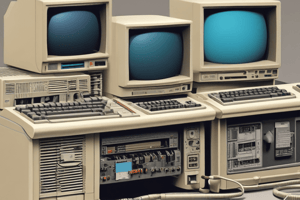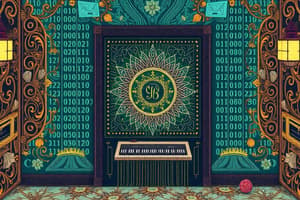Podcast
Questions and Answers
Who invented the mechanical calculator in 1623?
Who invented the mechanical calculator in 1623?
- Ada Lovelace
- Charles Babbage
- Wilhelm Schickard (correct)
- Alan Turing
Which mathematician published the paper 'On Computable Numbers' in 1936?
Which mathematician published the paper 'On Computable Numbers' in 1936?
- Alan Turing (correct)
- Howard Aiken
- Grace Hopper
- Charles Babbage
What was the primary component for processing and storage in early computers?
What was the primary component for processing and storage in early computers?
- Transistors
- Vacuum Tubes (correct)
- Integrated Circuits
- Microprocessors
Which innovation marked the transition from vacuum tubes to integrated circuits in computer hardware?
Which innovation marked the transition from vacuum tubes to integrated circuits in computer hardware?
Which invention laid the groundwork for modern computers alongside Ada Lovelace's visionary notes?
Which invention laid the groundwork for modern computers alongside Ada Lovelace's visionary notes?
What significant improvement did computers see in the 1950s with the replacement of vacuum tubes by transistors?
What significant improvement did computers see in the 1950s with the replacement of vacuum tubes by transistors?
Which computer was the first to use transistors and is considered the first general-purpose computer to do so?
Which computer was the first to use transistors and is considered the first general-purpose computer to do so?
In what year did IBM introduce the IBM System/360 family of computers, which represented a major milestone in computer architecture standardization?
In what year did IBM introduce the IBM System/360 family of computers, which represented a major milestone in computer architecture standardization?
What was the key innovation of the Intel 4004 microprocessor released in 1971?
What was the key innovation of the Intel 4004 microprocessor released in 1971?
Which milestone in computer history paved the way for the personal computer revolution?
Which milestone in computer history paved the way for the personal computer revolution?
Study Notes
The Evolution of Computers: From Invention to Modern-Day Machines
In the vast tapestry of human technological achievement, the computer stands as a pivotal thread, weaving together advancements in computation and communication. Our journey through computer history will delve into the origins of the first computers, the evolution of their hardware, and seminal moments that marked their progress.
The First Computers: An Age of Mechanical Calculation
The concept of computing machines can be traced back to the 17th century, with the invention of the mechanical calculator by the German mathematician Wilhelm Schickard in 1623. By the 19th century, innovations like Charles Babbage's Analytical Engine and Ada Lovelace's visionary notes on its potential laid the groundwork for the modern computer. However, it wasn't until the 20th century that the first programmable computers were built.
In 1936, the British mathematician Alan Turing published his seminal paper "On Computable Numbers," which introduced the concept of a universal machine, now known as a Turing machine. This theoretical framework laid the foundation for future computer design.
From Vacuum Tubes to Integrated Circuits: Advances in Hardware
Early computers relied on vacuum tubes as their primary components for processing and storage. In 1941, Howard Aiken and Grace Hopper at Harvard University built the Harvard Mark I, the first large-scale programmable computer, which used over 750,000 vacuum tubes.
As transistors replaced vacuum tubes in the 1950s, computers became more reliable, smaller, and less expensive. The Transistorized Computer (TSEC) at the University of Illinois, developed in 1952, was the first general-purpose computer to use transistors, while the IBM 7030 Stretch (1961) was among the first mass-produced computers to use transistors nearly exclusively.
By the 1960s, integrated circuits (ICs) combined thousands of transistors onto a single chip, further reducing the size and cost of computers. The Intel 4004, released in 1971, was the first microprocessor, a single chip containing a complete CPU. The 8-bit Atari 2600 video game console, released in 1977, was the first mass-produced system to use a microprocessor.
Key Milestones in Computer History
- 1943: The Electronic Numerical Integrator and Computer (ENIAC) was completed at the University of Pennsylvania. It was the first electronic general-purpose computer and weighed 30 tons.
- 1951: The first transistorized computer, the Ferranti Mark 1, was delivered to the University of Manchester, England. It was also the first commercially available computer.
- 1959: IBM introduced the 1401, one of its earliest successful commercial computers, which was designed specifically for business applications.
- 1964: The IBM System/360 family of computers was released, representing a major milestone in the standardization of computer architecture, as well as the introduction of high-level programming languages.
- 1973: The first microcomputer, the MOS Technology 6502, was released, paving the way for the personal computer revolution. The Altair 8800, released in 1974, was the first successful personal computer kit for hobbyists.
- 1977: The Apple II and Atari 2600 were released, marking the beginning of the home computer and video game console markets.
- 1981: The IBM Personal Computer (PC) debuted, standardizing the use of the x86 instruction set, MS-DOS operating system, and other technologies that became the foundation of the modern desktop computer.
A Continuing Quest for Progress
From the vacuum tube computers of the 1930s to the smartphones and supercomputers of the 21st century, computers have been a driving force of modern society. The evolution of computers will no doubt be marked by future innovations and applications that we have yet to imagine. As we continue to explore the boundaries of computation and connectivity, the foundational principles and milestones of computer history serve as a testament to the extraordinary potential of these remarkable machines.
Studying That Suits You
Use AI to generate personalized quizzes and flashcards to suit your learning preferences.
Description
Explore the historical journey of computers from the invention of mechanical calculators in the 17th century to the development of modern-day machines. Learn about key milestones, advances in hardware, and pivotal moments in computer history.




